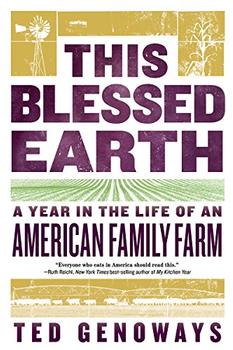Summary | Excerpt | Reviews | Beyond the Book | Readalikes | Genres & Themes | Author Bio

A Year in the Life of an American Family Farm
by Ted Genoways
Rick even agreed to let the antipipeline nonprofit Bold Nebraska build a solar-powered barn, the so-called Energy Barn, on land he rented from his in-laws. The publicity had brought in an unexpected amount of national press, culminating in Willie Nelson and Neil Young joining forces with Bold Nebraska to mount the fund-raising Harvest the Hope concert in the cleared cornfield of Art Tanderup, a farmer near Neligh, Nebraska, whose land was also threatened by the pipeline. But unpublicized amid all the hoopla was the reality that the barn, built in the middle of a productive piece of farmland, had cost Rick still more precious acres of ground, where he had planned to plant soybeans that year.
Worse still was a letter that arrived soon after from one of Rick's neighbors. He had rented hundreds of acres to Rick for many years, but now, in protest, was pulling out of that long-standing agreement—a move that was likely to cost the Hammonds between $150,000 and $200,000 of gross income for the coming year. The cancellation letter made no bones about the reasons: "I am sorry to inform you that your outspoken endorsement of defeating the Keystone Pipeline is not in our common interest. While it is certainly your right to support whatever causes you wish, we have chosen not to subsidize those expenditures."
With these financial hurdles ahead, Rick had decided to take some calculated risks. He planted almost entirely soy-beans for the fields not already set aside to raise seed corn for Pioneer, because the bean prices seemed steadier, and he went with short-season beans, hoping to get the harvest in ahead of the inevitable market decline. Some giant grain companies, like Archer Daniels Midland, will even pay out a premium early in the harvest. "I planted really short-season beans, planning on getting it to ADM," Rick told me, "because there might be a dollar bonus above your elevator if you can get it in before the rush." He also made the decision to wait on marketing his beans, rather than locking in spring prices. Most years, he would have seen spring futures as good enough to hedge against fluctuations, but this year he'd decided to take a chance. "I'm not nearly as forward contracted this year as I usually am," he said.
That crop, waiting to be harvested and sold by the truck- load at whatever the market would eventually bear, was where the family was either going to make money or see a whole year's labor turn into a break-even proposition—or worse. With the weather conspiring to increase the national yield and push prices lower by the day, while leaving Rick's fields too soggy to get out and harvest those short-season beans, he was losing money with every passing hour.
So Rick had decided to lay a concrete footing and move in an old grain bin. He would put up as much of the soybean harvest as possible—and, with luck, wait out the down mar- ket. When he and Kyle brought the bin in and put it in place with a crane, he explained that even this stubbornness was its own form of risk. Grain in the bin is given to rot—and, of course, there's always the chance that prices will continue to fall. But you control what you can. Don't increase your risk by investing in a new bin, but make sure the old one is tight and well-ventilated. Make sure the floor is raised so an industrial blower can force through enough air to keep the grain dry. And after everything that's already happened, be realistic.
"You have some hardheaded old-timers that say, 'By God, beans were at seventeen dollars two years ago, and I'm going to leave my beans in the bin until it's seventeen dollars again." Rick shook his head. "You want to say: 'At your age? Good luck with that.' It's not going to happen." So, in your heart of hearts (though you'd never admit it, not even to your neighbors), you pray for rootworm in Chile, for hail on the open plains of Illinois, a late-season catastrophe unforeseen by the USDA. You hope for what the traders call a "market recovery," knowing that what that really means is that, in order for you to succeed, someone else as careful as you, through no fault of his own, has to fail.
Excerpted from This Blessed Earth by Ted Genoways. Copyright © 2017 by Ted Genoways. Excerpted by permission of W.W. Norton & Company. All rights reserved. No part of this excerpt may be reproduced or reprinted without permission in writing from the publisher.
Your guide toexceptional books
BookBrowse seeks out and recommends the best in contemporary fiction and nonfiction—books that not only engage and entertain but also deepen our understanding of ourselves and the world around us.